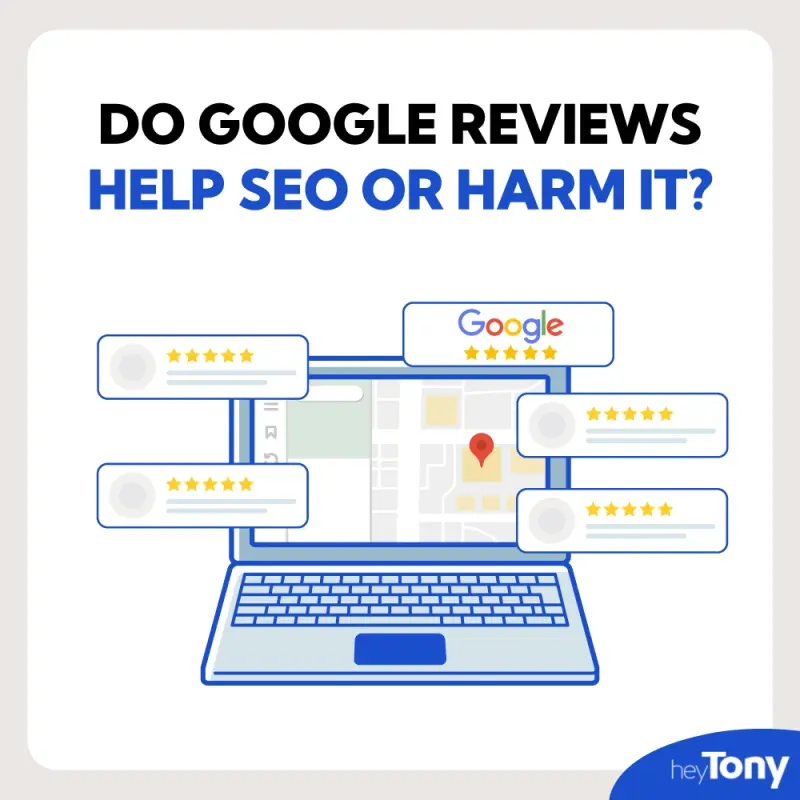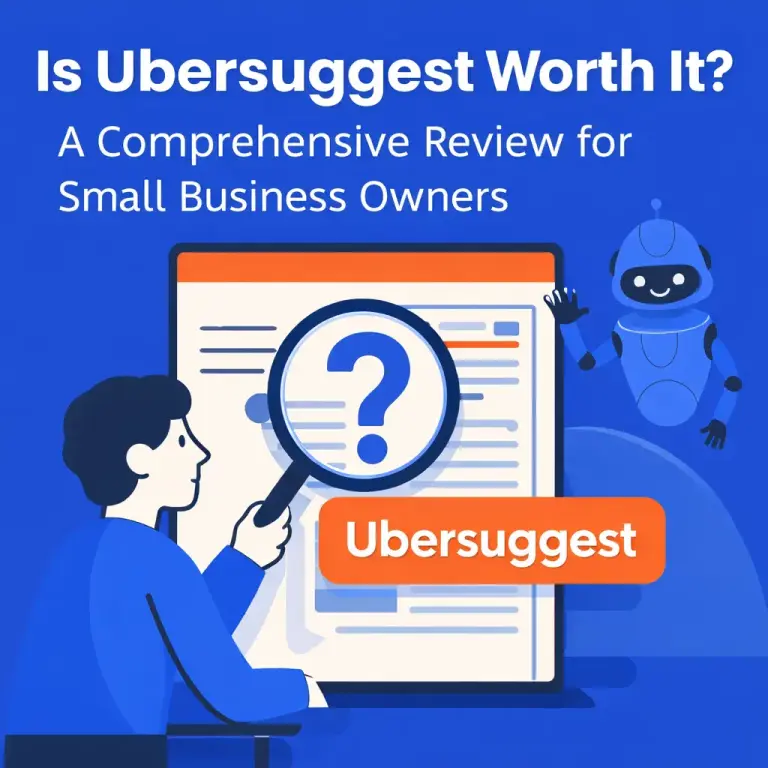Did you know that 93% of consumers say online reviews influence their purchase decisions? And if they have a bad experience, 95% of them are likely to tell others. That makes customer reviews important for your reputation, and potentially powerful for your search engine rankings as well. With so much riding on what people say about your business, it’s no wonder business owners are asking: Do Google reviews help SEO?
In this blog, we’ll explore how Google reviews influence your visibility in search results, what makes a review valuable, and how you can use them to build lasting trust and higher rankings.
Do Google Reviews Help SEO? Let’s Clear Things Up
Yes, Google reviews do help SEO, especially for local businesses. They influence several important ranking factors like visibility in the Map Pack, user engagement, and even keyword relevance. Google uses signals from your reviews to gauge your trustworthiness, prominence, and how relevant your business is to search queries. Responding to reviews and consistently collecting new ones can amplify these benefits even more.
Here’s how reviews impact SEO in practical ways:
- Increase Local Visibility: Positive reviews contribute to higher placement in local search results and Google Maps.
- Boost Click-through Rates: Star ratings and review volume make your listing more appealing to users in search results, increasing its visibility.
- Add Keyword Relevance: Customer language in reviews often includes valuable long-tail keywords that strengthen your relevance.
In short, reviews are not just about reputation—they’re a powerful SEO tool. When managed properly, they can lead to stronger rankings, better engagement, and more qualified leads.
How Much Do Google Reviews Help SEO vs. Other Ranking Factors?

Google reviews are a powerful component of local SEO, but they’re not the only ranking signal that matters. To understand their real impact, it is helpful to compare reviews with other key SEO factors, such as backlinks, content quality, and technical performance.
Review Volume vs. Backlinks
Review volume and backlinks both serve as indicators of authority, but in different ways. Backlinks boost your site’s domain authority and trustworthiness in traditional organic SEO. Meanwhile, a high number of authentic Google reviews can rapidly improve local visibility, especially in the Map Pack. While backlinks are essential for broader reach, review volume is often more influential for location-based searches.
Star Ratings vs. Content Quality
Star ratings can directly influence click-through rates by creating trust at a glance. However, content quality remains one of Google’s core ranking factors across all search types. Great content answers user intent, keeps visitors on your site, and feeds Google’s understanding of your topic relevance. Star ratings might get you noticed, but it’s your content that convinces users to stay.
Keywords in Reviews vs. On-Page SEO
Keywords found in customer reviews can reinforce your business’s relevance to particular search queries. When users mention specific services or locations, it helps Google associate your listing with those terms. However, this complements—not replaces—intentional on-page SEO like meta titles, headers, and body content. Both types of keyword usage are valuable, but on-page SEO provides more control.
User Engagement vs. Technical SEO
Google tracks user engagement metrics like clicks, time on site, and bounce rates to assess content quality. Reviews drive engagement by increasing trust and encouraging users to interact with your business listing. On the other hand, technical SEO ensures that your site loads quickly, is mobile-friendly, and is crawlable by search engines. Together, they shape the user experience—but engagement often influences conversions more directly.
What Makes a Review Valuable in Google’s Eyes
Google doesn’t just count your reviews—it analyzes them. For a review to be valuable in the eyes of Google’s algorithm, it needs to demonstrate authenticity, relevance, and engagement. The quality, content, and timing of the review all influence how much it supports your search ranking.
Here’s what Google tends to prioritize:
- Recency: New reviews show that your business is active and regularly engaging with customers.
- Detail and Length: Thoughtful reviews with specific information about products, services, or experiences help Google understand what you offer.
- Keyword Relevance: Naturally included terms like your location, service type, or niche keywords reinforce topical authority.
- User-generated Media: Reviews with photos or videos tend to perform better, both for SEO and customer trust.
How Google Actually Ranks Local Businesses

Google uses a mix of signals to rank local businesses in search results, aiming to provide users with the most relevant and trustworthy options. Here are key elements Google considers when ranking local businesses.
Relevance to Search Terms
Relevance measures how well your business matches what someone is searching for. This includes your business category, services, and keywords in your Google Business Profile, as well as reviews. The more your listing aligns with the user’s query, the more likely it is to appear in local results.
Review Quality and Quantity
Google weighs both the number of reviews you have and how useful or authentic they appear. A steady flow of high-quality reviews—especially those with detailed and contextual information—boosts your prominence in search results.
Engagement and Responses
Google takes note of how active and engaged a business is with its reviews. Replying to reviews—especially negative ones—shows customer care and signals credibility.
Keyword Use in Reviews
When customers naturally include keywords in their reviews, such as specific services or locations, Google picks up on those signals. This user-generated content reinforces your relevance for related search terms.
What Happens When Reviews Go Wrong?
While positive reviews can boost your visibility and trust, the wrong kind of reviews can have the opposite effect, damaging your reputation and even hurting your SEO. Google’s algorithm can detect unnatural review patterns, penalize listings with fake or spammy reviews, and deprioritize businesses that appear inactive or untrustworthy.
Here’s what to watch out for:
- Fake or Incentivized Reviews: Google may remove suspicious reviews or penalize your listing for violating its guidelines.
- Lack of Review Recency: Old or outdated reviews signal inactivity and can cause your listing to be pushed lower in local search results.
- Overly Perfect Ratings: A stream of only five-star reviews can appear inauthentic, which can reduce customer trust and click-through rates.
The key is balance. A natural mix of reviews, paired with honest responses, keeps your profile trustworthy and your rankings stable.
Where to Focus Your Review Strategy for the Best SEO Impact

Not all reviews carry the same weight when it comes to improving your SEO. To get the most out of your customer feedback, focus on strategies that align with Google’s ranking signals and build long-term trust with genuine users.
Encourage Honest Feedback
Encouraging authentic, unprompted feedback helps you build a natural review profile that Google can trust. Customers are more likely to leave reviews when the process is simple, such as receiving a direct review link after a purchase or service. Avoid incentivizing reviews, as this can violate Google’s guidelines and hurt your credibility.
Respond to Every Review
Does replying to Google reviews help SEO? Absolutely. Google sees consistent engagement as a sign of an active, reputable business. Responding to both positive and negative reviews shows you value customer input, boosting your visibility in local results.
Embed Reviews on Your Site
Adding reviews to your website not only increases trust but also creates keyword-rich user-generated content. When paired with review schema markup, embedded reviews can enhance your search presence through rich snippets and higher click-through rates.
Optimize Your Google Profile
Your Google Business Profile is the central hub for local SEO, so keeping it accurate and complete is key. Add high-quality photos, list your services, and update your hours regularly. A well-optimized profile increases the visibility of your reviews and enhances the appeal of your listing in search results.
How HeyTony Helps You Build Trust and Rankings
At HeyTony, we understand that SEO isn’t just about keywords—it’s about building a trustworthy brand that people (and search engines) want to engage with. That’s why we help businesses strengthen their online presence through a mix of technical strategy, high-converting design, and review-focused optimization.
Here’s how we help:
- Search Engine Optimization: We optimize your site for rankings and use customer reviews to substantiate and strengthen your content.
- Meta Ads: Our targeted paid ads on Facebook and Instagram increase visibility and drive more traffic to your business, helping generate more leads and conversions.
- Web Design: We build sleek, responsive websites that are not only optimized for SEO but also make it easy to highlight and display reviews that build trust.
As experts in SEO in Hamilton and beyond, HeyTony offers practical strategies and hands-on support to help your business stand out.
Conclusion: So, Do Google Reviews Really Help SEO?
In conclusion, do Google reviews help SEO? Yes! When managed properly, they can significantly boost your local visibility, increase trust with both users and Google, and drive more clicks and engagement to your business profile.
If you’re ready to turn your reviews into real SEO results, contact us at HeyTony or check out more actionable tips on our blog.
FAQs About Google Reviews and SEO
Does Google reviews help SEO for small businesses?
Yes, Google reviews can significantly improve SEO for small businesses by boosting visibility in local search results, increasing trust, and driving more clicks to your listing.
Does responding to Google reviews help SEO?
Yes, responding to Google reviews signals engagement to Google’s algorithm and helps build trust with both the search engine and potential customers.
How long does it take for Google reviews to impact SEO?
Google reviews can start influencing local SEO within a few weeks as new reviews are indexed and user engagement signals begin to build.
Can fake Google reviews hurt your SEO ranking?
Yes, fake reviews can trigger penalties, reduce your credibility, and negatively impact your ranking if detected by Google’s algorithm.
FAQs About HeyTony
Does HeyTony manage Google review responses?
Yes, HeyTony helps businesses craft thoughtful, SEO-friendly responses to Google reviews that support both reputation and rankings.
Does HeyTony write SEO-optimized content for local businesses?
Absolutely—HeyTony specializes in creating location-targeted, keyword-optimized content that strengthens your local search presence.
How does HeyTony help with local SEO?
HeyTony boosts local SEO through strategic content creation, Google Business Profile optimization, and targeted link-building to enhance your site’s authority
What tools does HeyTony offer for SEO management?
HeyTony provides tools for keyword tracking, content planning, reputation monitoring, and performance analytics to support ongoing SEO growth.
Explore More



